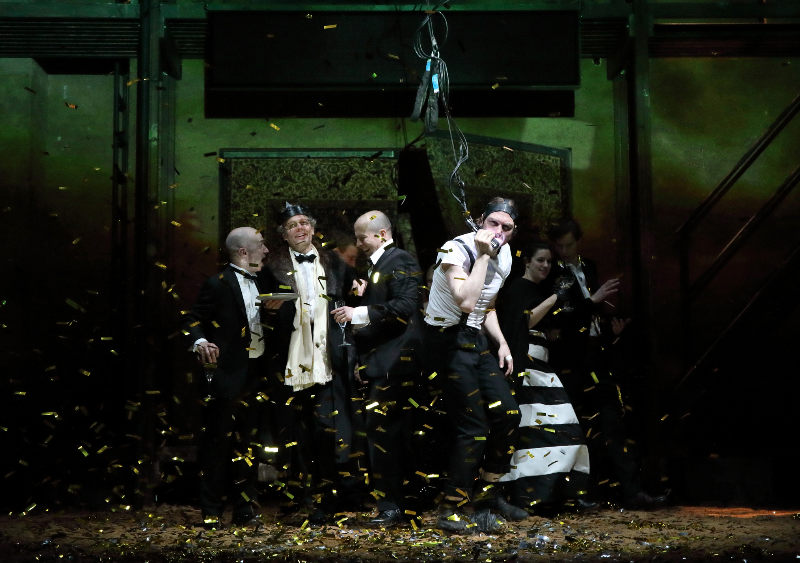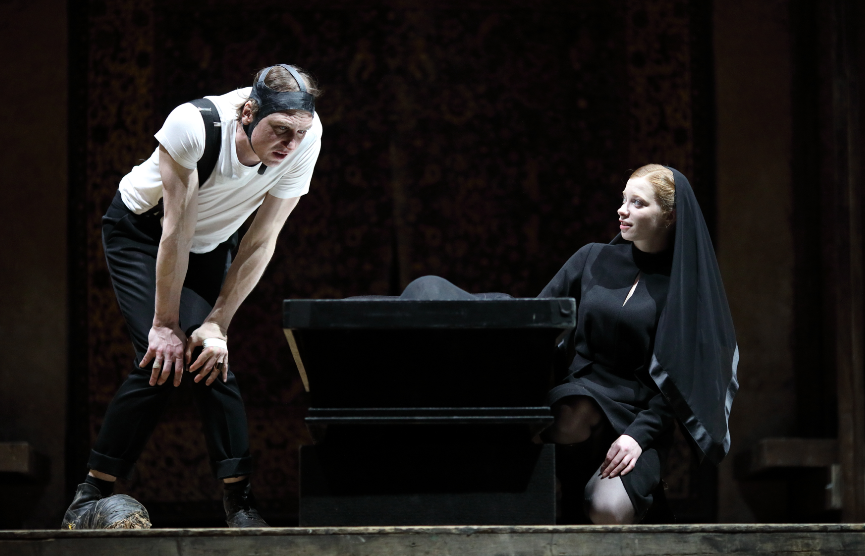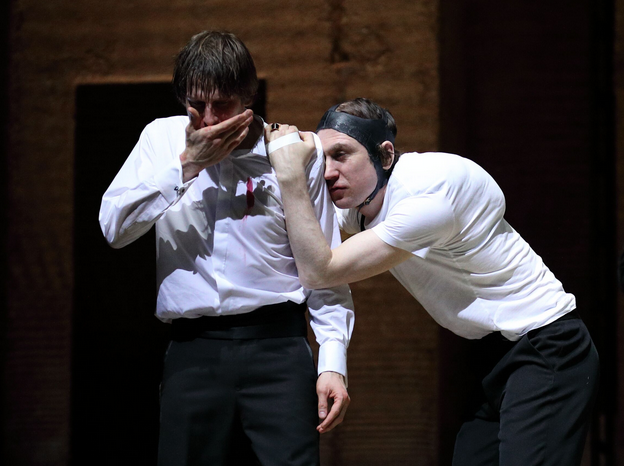Thomas Ostermeier has never been one to embrace the rulebook. His psycho-slapstick Hamlet for Berlin’s Schaubühne Theater, seen at the Sydney Festival seven years ago, cast Lars Eidinger as an overweight, bumbling child rolling around in the mud and rain. Gertrude and Ophelia were played by the same actor, and the script was regularly shredded with frequent ad libs in English as well as auf Deutsch. His take on Shakespeare’s Richard III, with Eidinger again as a spitting, pissing arch-cripple, roils into Adelaide as one of several (I lose count) headline acts, and while not as radical or revolutionary as Ostermeier’s take on the Dane, it still offers plenty of semi-masticated food for thought.
 Lars Eidinger and cast in Richard III. Photos © Tony Lewis
Lars Eidinger and cast in Richard III. Photos © Tony Lewis
I use the term arch-cripple advisedly. That is how Ostermeier’s Richard has been labelled from birth, to the extent that he now identifies as such. Hobbling around a court of vacuous, self-serving hedonists, he’s overlooked, underestimated and, when not actively despised, he’s pitied. Excusing himself from the daily round of party poppers and booze, he mops and mows, while boiling on the inside with hatred and contempt. Grabbing a vintage microphone to make himself heard, he’s both stand up comedian and punk rocker (think Ian Dury here in full Spasticus Autisticus mode). Inviting us into his world with a wince and a smirk, as Shakespeare intended we willingly follow.
But despite his meteoric rise to the top, this Richard is never able to slough off the slings and arrows that have been his lot since childhood, no matter how straight and tall he tries to stand in corset and neck brace. The higher he flies, the more he regresses to the nursery, dribbling and puking up his baby food and behaving increasingly like the playground bully. “You look like shit,” he taunts a Buckingham freshly smeared with chocolate pudding. “Have you eaten pussy today?” He even gets the audience chanting along with him in a classic act of political ritual humiliation – think “lock her up” or “ditch the witch”. By the time he stands on the table to (scarily convincingly) take a piss in the dirt, we sense his regime must either tumble, or in Ostermeier’s internalised ending, collapse in on itself.
Jan Pappelbaum’s grungy 1940s bunker of a set with its echoes of the Elizabethan Globe Theatre is a simple, yet powerful playing space while Florence von Gerkan’s glamorous costumes reflect the fag end of an empire. Erich Schneider’s atmospheric lighting combines neatly with Sébastien Dupouey’s projections that subtly reflect the outside world of battles and Bosworth where Richard’s personal ‘Wintereisse’ will ultimately lead him. Nils Ostendorf’s edgy music, full of amplified thrash and live drum kit, lends it all an effective air of threat and menace.
 Lars Eidinger and Jenny König in Richard III. Photos © Tony Lewis
Lars Eidinger and Jenny König in Richard III. Photos © Tony Lewis
Although it’s always visually arresting, it doesn’t all work. It’s a long (two and thee quarter hours) evening with no interval, and although some characters are cut – Richard’s mother, for example – the show could easily have lost more text. Some of the longer scenes lose momentum, and the final dream sequence and hurried ending isn’t quite the coup de theatre it tries to be. Having the Princes played by puppets feels like an expedient, sacrificing much of the visceral horror of child-murder.
Richard’s rapping feels a bit extraneous and we only catch the odd word (“The devil doesn’t wear Prada” is one of the better lyrics). And while Eidinger wears an obvious strap-on hump and clown boot, a typically Germanic distancing effect, it can leave an audience uncertain about the authenticity of Richard’s physical condition. Having him strip stark naked in front of Lady Anne, however, is a stroke of genius and her ensuing confusion is laden with fascinating complexities.
Eidinger is a fascinating actor to observe. For all Richard’s artificial physical grotesqueries, he’s utterly convincing as a human being and imbued a dangerously sensual charm. With a Goebels-like subtlety (ie. quite unlike Trump), he’s a master of his own brand of fake news. Seldom has Richard’s deceit and propaganda felt so utterly reasonable. His regression in the second half is both repellent and deeply sad.
 Lars Eidinger and Christoph Gawenda in Richard III. Photos © Tony Lewis
Lars Eidinger and Christoph Gawenda in Richard III. Photos © Tony Lewis
The rest of the cast are decent to fine. Jenny König’s sad young Anne and the haughty, selfish Elizabeth of Eva Meckbach capture the right sense of inner conflict when confronted by Eidinger’s blubbering deceiver. Having a straight-laced Margaret played by a man (Robert Beyer) without a trace of madness works well – they don’t believe her not because she’s loopy, but because they don’t want to. Thomas Bading’s sybaritic Edward and David Ruland’s bureaucratic Hastings capture the conflicting tensions at the heart of the Yorkist court.
While Ostermeier’s Richard III offers a compelling psychological portrait of a politician conditioned by his childhood to behave like a baby – now which world leader can he be thinking of? – it comes at the cost of Shakespeare’s equal interest in the Machiavellian politics of the period. Nevertheless, the chance to catch one of the world’s most interesting theatre companies in an Australian exclusive should not be missed.
Richard III is at Adelaide Festival until March 9











Comments
Log in to join the conversation.